|
|
|
Sort Order |
|
|
|
Items / Page
|
|
|
|
|
|
|
| Srl | Item |
| 1 |
ID:
172319
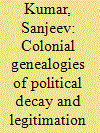

|
|
|
|
|
| Summary/Abstract |
This article is an attempt to conceptualise and theoretically explain the colonial genealogies of the processes of state-making and state-construction in post-colonial South Asia. In pursuit of this, the article seeks to theorise the colonial ways of providing a sense of fixity of political territoriality, held together by colonially crafted institutions of metropolitan governance, as an independent variable in determining the nature of the processes of state-making and state-construction in the region. On this count, an enquiry into the complex trajectory of these post-colonial political processes, which are the dependent variables for this article, is the fundamental problematic of analysis. This problematic would be decoded with the help of a dual conceptual framework, involving what Samuel Huntington designates as political decay and the legitimation crisis given by Jurgen Habermas. In the context of South Asia, the predicaments of political decay and legitimation crisis, according to this article, manifest as after-effects of engagement on the part of the region’s post-colonial polities with the imported values of colonial modernity and neoliberal economic reforms. By drawing instances from two countries of the Indian subcontinent, Pakistan and Bangladesh, the article tries to show how these after-effects have played out in the form of a tumultuous political history of the processes of state-making and state-construction. The article, in this way, is an attempt to theorise the inter-sectionalities between the colonial and post-colonial periods of South Asia. This has been done here by problematising such a historical inter-sectionality from the perspective of the two intervening variables—the received values of colonial metropolis and the morals of modernity—mediated through neoliberal economic reforms.
|
|
|
|
|
|
|
|
|
|
|
|
|
|
|
|
| 2 |
ID:
090898
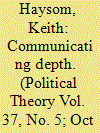

|
|
|
|
|
| Publication |
2009.
|
| Summary/Abstract |
This essay takes as its task the critical comparison of two thinkers who are rarely matched or studied in tandem: Jürgen Habermas and Maurice Merleau-Ponty. It stages a (largely) speculative dialogue between the two thinkers, considering not only the points of convergence but their likely objections to each other's accounts of communication and language. I will argue that Merleau-Ponty, whose own concerns significantly overlap with Habermas's, while simultaneously pulling in a different direction, serves as a useful counter-point to Habermas. This is so because Merleau-Ponty offers us an intersubjectivist account of praxis, from which can be extrapolated an ethics of communicative engagement between self, other, and world. Such a phenomenological and/or existential rereading of the central Habermasian problematic not only compensates for the notorious abstraction of Discourse Ethics, but better underscores possibilities for social transformation inherent in intersubjectivity and the lifeworld than are acknowledged by Habermas.
|
|
|
|
|
|
|
|
|
|
|
|
|
|
|
|
| 3 |
ID:
073489
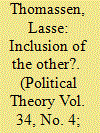

|
|
|
|
|
| Publication |
2006.
|
| Summary/Abstract |
In his most recent work, Jürgen Habermas has proposed a deliberative account of tolerance where the norms of tolerance-including the threshold of tolerance and the norms regulating the relationship between the tolerating and the tolerated parties-are the outcomes of deliberations among the citizens affected by the norms. He thinks that in this way, the threshold of tolerance can be rationalized and the relationship between tolerating and tolerated will rest on the symmetrical relations of public deliberations. In this essay, and inspired by Jacques Derrida's work on the concept of hospitality, I propose a deconstructive reading of Habermas's writings on tolerance. I argue that Habermas is ultimately unable to provide a rational foundation for tolerance and that his conception of tolerance encounters the same problems he is trying to avoid, namely, the contingency of the threshold of tolerance and a paternalistic relation between tolerating and tolerated. Yet, contra Habermas, the deconstruction of tolerance does not result in its destruction and does not force us to give up on the concept and practice of tolerance.
|
|
|
|
|
|
|
|
|
|
|
|
|
|
|
|
| 4 |
ID:
109940


|
|
|
|
|
| Publication |
2012.
|
| Summary/Abstract |
Habermas's paradigm of communicative action is usually taken to be pretty much dominated by consensus, "Yes-saying." What if this were a radically one-sided perception? We take up this unorthodox position by arguing that "no-saying" in this paradigm is typically overlooked and underemphasized. To demonstrate this, we consider how negativity is figured at the most basic onto-ethical level in communicative action, as well as expressed in civil disobedience, a phenomenon to which Habermas assigns the remarkable role of "touchstone" (Prufstein) of constitutional democracy. Once the importance of no-saying is drawn out, the paradigm looks distinctly less hostile to dissensus and agonism in democratic life.
|
|
|
|
|
|
|
|
|
|
|
|
|
|
|
|
| 5 |
ID:
157484
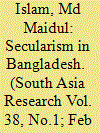

|
|
|
|
|
| Summary/Abstract |
Ever since Bangladesh became independent in 1971 and proclaimed secularism among its four-pronged constitutional core objectives, the world’s third largest Muslim country has been struggling with this concept and its practical manifestations. The temptation of misusing religion in heavily politicised contexts and contestations over social, political and economic interests and development remains ever-present. The violently antagonistic relations between secular and non-secular forces, this article offers some fresh insights into the dynamics of relationships between religion, politics and Islamist militancy in contemporary Bangladesh through discourse analysis. While the hegemonic nature of the deeply contested state apparatus has dominated the headlines, the space for secularism as a sustainable common platform for all people of Bangladesh has appeared to be shrinking. However, this article shows that not all is lost, provided new balances can be found.
|
|
|
|
|
|
|
|
|
|
|
|
|
|
|
|
| 6 |
ID:
156700
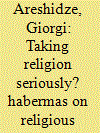

|
|
|
|
|
| Summary/Abstract |
This article evaluates Jürgen Habermas's attempt to reopen political liberalism to religion. In trying to “take religion seriously,” Habermas goes further than John Rawls and other liberal theorists by affirming that religious traditions articulate truths on which democratic societies continue to depend for their civic and moral health. “Post-secular” societies, in his view, should learn from religion by translating its “moral intuitions” into universal secular language. Although Habermas in this way appears friendlier to religion than Rawls, unlike Rawls he also calls for the “modernization of religious consciousness.” This theological transformation not only reveals the foundationalist presuppositions of liberalism, but also points to a highly attenuated conception of learning from religion. Taking religion seriously will require us to be open to its insights not only when they agree with, but especially when they challenge, our secular presuppositions. This dimension of religion is at risk of getting “lost in translation” in the Habermasian paradigm.
|
|
|
|
|
|
|
|
|
|
|
|
|
|
|
|
| 7 |
ID:
176715


|
|
|
|
|
| Summary/Abstract |
In this paper I present findings and insights from an empirical study of two case study solar farm developments from rural areas of the South West, UK. Drawing on a Habermasian theoretical frame, I examine local resident narratives that emerged through the local public sphere and how these formed discursive meanings that provided shared background social norms for residents towards the solar farm developments. The paper begins by operationalising Habermas's theoretical ideas for empirical research and situating the research within existing literature. The theoretical and methodological sections are followed by the examination of three local narratives that emerged: idealised rural land use, farming and income generation, and money making and the pursuit of profit. Such narratives are considered in view of public opportunities for robust dialogue and debate to judge the normative democratic character of the solar farm developments. The paper concludes that the community development offered significantly more discursive space for debate than the commercial development and increased the developments' overall democratic legitimacy. It is maintained that such a Habermasian theoretical frame adapted for empirical analysis is valuable for normatively assessing democratic processes which are needed in view of conceptually weak accounts of ‘energy democracy’.
|
|
|
|
|
|
|
|
|
|
|
|
|
|
|
|
| 8 |
ID:
076862


|
|
|
|
|
| Publication |
2007.
|
| Summary/Abstract |
While scholars of International Relations and comparative politics have usually treated rhetoric as epiphenomenal, one strand of constructivism has recently returned rhetoric to the heart of political analysis, especially through the mechanism of persuasion. We too maintain that rhetoric is central to political processes and outcomes, but we argue that persuasion is theoretically and methodologically problematic. We aver that rhetoric's role may be more usefully conceptualized in the context of coercion, and we advance a stylized model that illustrates how rhetorical coercion operates, explains why it works, and identifies key scope conditions. We subsequently illustrate our model's relevance through a detailed examination of a 'hard' case. This article's agenda is twofold. First, it advises scholars in these fields to avoid focusing on unanswerable questions about actors' motives and to examine instead what actors say, in what contexts, and to what audiences. Second, it lays the groundwork for a 'coercive constructivism', complementing the liberal version so prevalent today
|
|
|
|
|
|
|
|
|
|
|
|
|
|
|
|
|
|
|
|
|